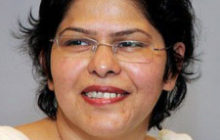By Zakaria Virk
Vision 2030 reforms aim to increase the percentage of Arabian working women from 22 percent to 30 percent. Saudi Arabia has embarked on an ambitious drive to ease social controls, re-introduce entertainment and empower women at all levels, including giving them the rights to attend sporting events and to drive. The changes encompassed in Vision 2030 constitute revolution.
In recent months, Saudi Arabia has made major changes in line with Saudi Vision 2030 to involve more women in the workforce — and in the economic and social developments that the Kingdom is witnessing.
Last month Saudi Arabia hosted its ‘First Women-Only Arab Fashion Week’ in Riyadh with equal parts excitement and controversy. Princess Noura Bint Faisal Al-Saud, honorary president of the Arab Fashion Council in Riyadh, joined designers, influencers, and industry insiders from Ukraine to Lebanon for the inaugural season of fashion week at the Ritz-Carlton. It offered exclusively see-now-buy-now collections and pre-collections.
Saudi Arabia’s first cycle race for women was held in Manama on April 10th. Sporting history was made when 30 cyclists competed in the country’s first bicycle race for women. The competition, over a distance of 10 kilometers in Jeddah, is part of the “Be Active” campaign. Mecca hosted the first women’s marathon in the country through a partnership with Al Wehda Sports Club.
The ninth edition of ‘The Jewelry Salon’ was inaugurated at Hilton Hotel where more than 50 international companies from 11 countries took part, showcasing the most expensive collection of diamond and gem jewelry in the world. The world’s most famous designers presented their latest innovations in diamonds, gems, precious watches, and antiques. Of special interest is the fact that 22 Saudi promising female designers got the opportunity to showcase their products.
The first ‘Arab Women Forum’ was held at King Abdullah Economic City (KAEC). The forum heard numerous examples of women who had found business opportunities through technology, or where they had exploited aspects of their daily life to create business opportunities.
A long-standing ban on women driving will finally be lifted in June 2018. The announcement followed a royal decree in September 2017. Many women campaigned for the right to drive for years and some have been arrested for defying the ban. Women will be allowed to wear Bakinis at luxury beach resorts on the Red Sea. Women can serve in the military.
Women will be allowed into three stadiums in major cities. The General Sport Authority, the country’s governing body for sports, said in October 2017 that three of the country’s biggest stadiums will begin “accommodating families” early in the year. Men and women were able to sit together at several music concerts and events in 2017. Cinemas are now open after 35 years ban and movies are being shown. An Emoji Movie became first film screened in Saudi Arabia.
Government would issue its first tourist visas in 2018. Visas were previously restricted to people traveling to the country for work or to visit its holy sites in Mecca and Medina. Citizens have to pay VAT now to raise tax revenue for the government to be utilized for development works. Abaya is now not a mandatory attire for Saudi women.
♦
























